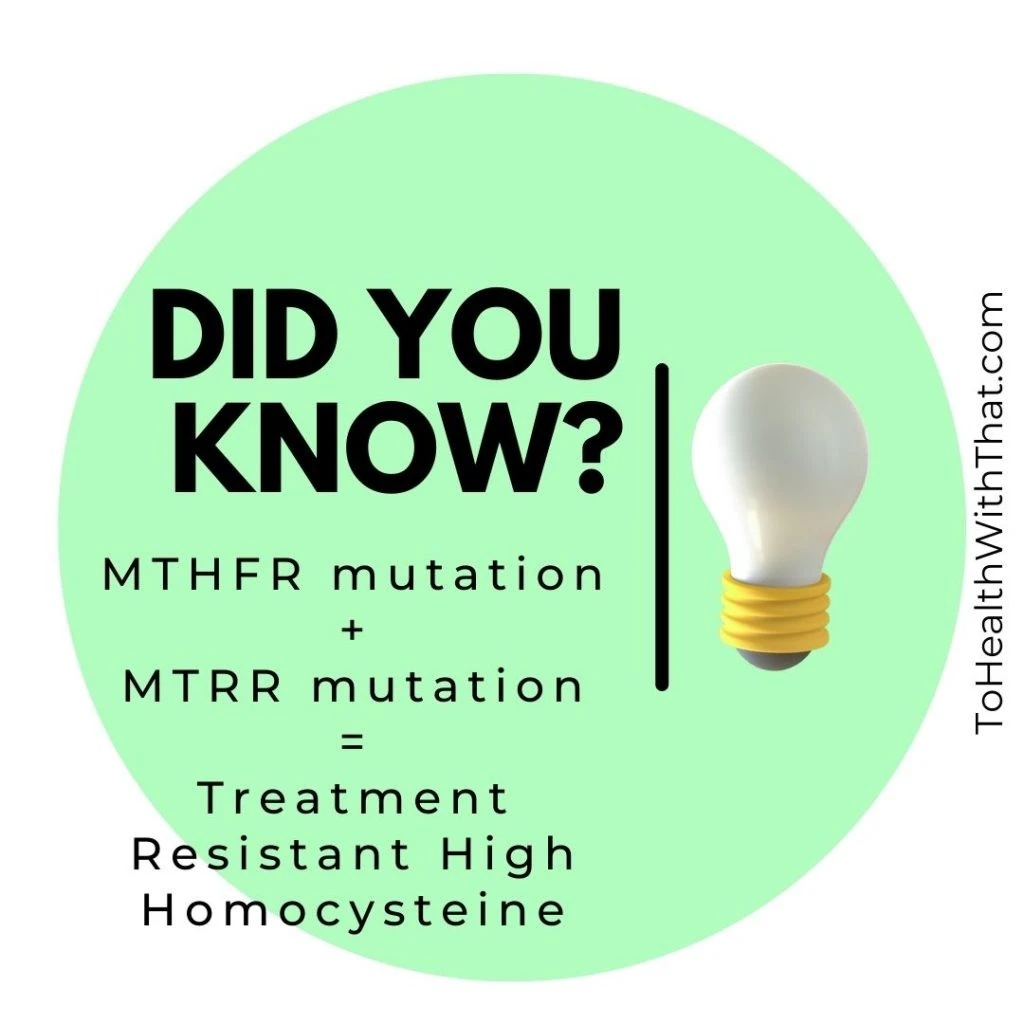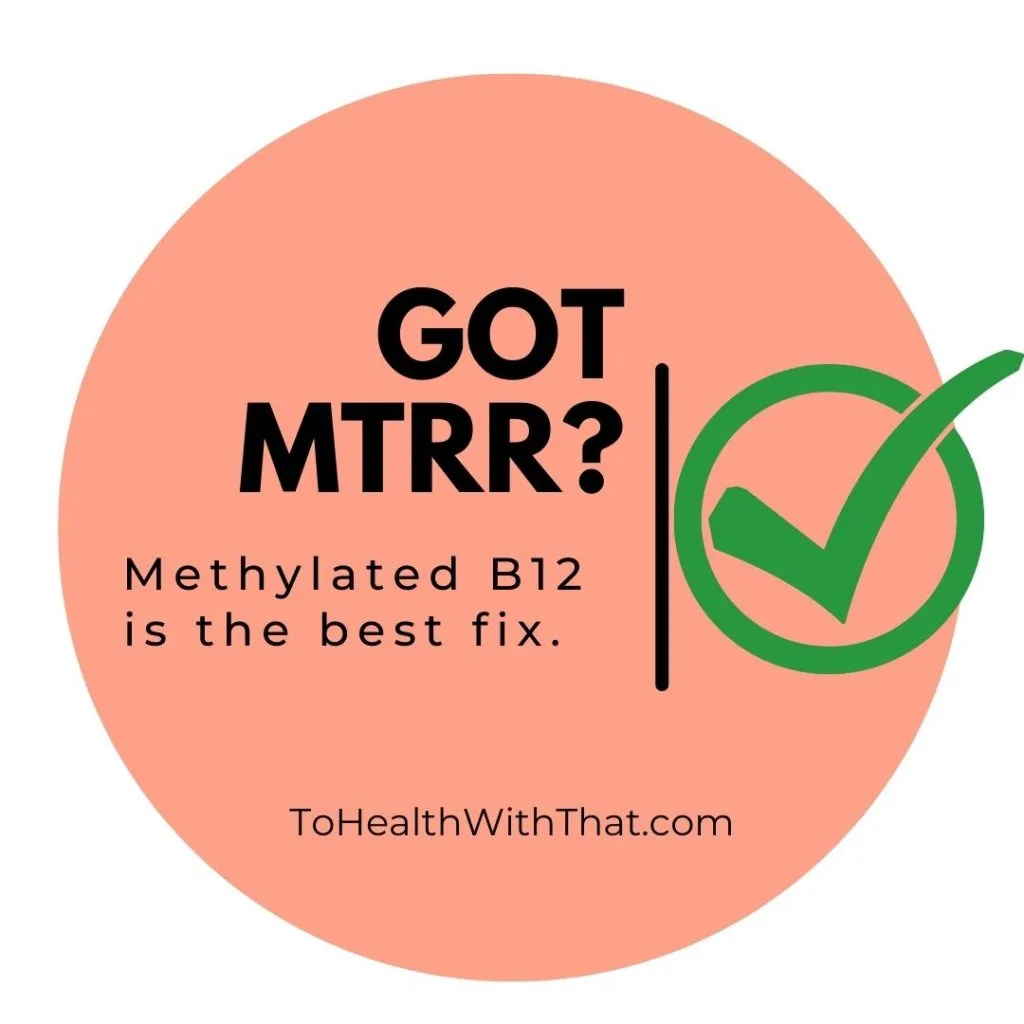B12 matters a lot for everyone. We’ve spoken about it before in terms of the best B12 for MTHFR mutants, and in general the link between B12 and MTHFR in season 2, episode 27.
You absolutely need B12 if you want to have anything like energy, good nerve function, or DNA in your cells. It works as a group with all of the other B vitamins but it is one of the more common vitamin deficiencies because you use so much of it.
B12 deficiency doesn’t feel very good. People with B12 deficiency get a form of anemia that makes them feel tired, weak, lightheaded, short of breath. Often it will cause tingling or burning in their feet or even hands. It isn’t any fun at all.
B12, just like folate, needs to be methylated to be active. Also just like folate, the methylated form doesn’t agree with everyone and for some people it leaves them feeling hyper or anxious or too wound-up. We’ve spoken about that in detail before so I won’t belabor a point. Today, I’d like to talk more about gene SNPs that change the way you use or process B12.
B12 is also, as you might have guessed, all up in there with the MTHFR gene and the methylation cycle. Now, let’s talk about why. Here’s a hint – it has to do with two gene SNPs that are closest to MTHFR. They’re called MTR and MTRR.
MTR Gene SNP
Hopefully by this time with so many episodes of this show under your belt, you know that you need B12 to have good methylation. But why? Well, MTR, which is another step in the methylation cycle, is a big part of the reason. MTR is the gene that codes for the enzyme methionine synthase and it is on the same pathway as the MTHFR gene in converting homocysteine back to SAM. Specifically, the methionine cycle.
That means that if your MTHFR isn’t working well, then the MTR gene also can’t work because it needs 5-LMTHF to function. It also needs methylcobalamin – the active form of B12 – from MTRR, but we’ll get to that in a minute. If both MTHFR and MTR are compromised, then you can see high homocysteine that is really hard to treat.
The MTR A2756G mutation speeds up this enzyme and can cause B12 depletion. The MTR is working so quickly that it uses up all the B12 you have and so you may see symptoms of B12 deficiency in other places. This is especially well documented with a C677T mutation.
MTR is also something of a genetic “decision point” – meaning it uses a feedback loop to help your body respond to oxidative stress. If there are a lot of free radicals floating around, then MTR slows down. Instead of converting homocysteine to methionine like usual., the slow MTR pushes homocysteine into the glutathione pathway instead. Boosting your body’s glutathione then helps to fight the free radicals.
Because MTR actually works on homocysteine, it can become sluggish if homocysteine becomes low. I believe that this is part of the reason why low homocysteine is associated with poor health outcomes even though conventional medicine doesn’t really consider a lower limit for homocysteine levels on blood tests. I spoke some about this in the episode in season one called Homocysteine by the numbers.

MTR polymorphisms usually show up as:
- B12 deficiencies that are difficult to fix
- High homocysteine that is difficult to fix (especially if there is also an MTHFR mutation)
MTR polymorphisms get better with:
- Good sources of B12 – especially methylcobalamin
- Adequate zinc
- Balanced thyroid
- Low oxidative stress
- Moderate exercise
- Chlorine filters for drinking water and showers
- Low formaldehyde home (no synthetic carpets, laminate floors) consider concrete, tile, real wood, cork or linoleum.
MTR polymorphisms get worse with:
- B12 deficiency
- Zinc deficiency
- Nitrous oxide (laughing gas)
- Heavy metal exposure
- Chlorine
- Formaldehyde
- Unbalanced thyroid hormones
- Overtraining
- Insulin resistance
- Oxidative stress, free radicals, SNPs that affect glutathione like GST and GPX.
MTRR Gene SNP
MTRR, or methionine synthase reductase, operates in a tight little loop with MTR in order to keep MTR functioning. MTR, which we just talked about, has to be bonded to a cobalamin. Cobalamin is vitamin B12. The MTR stops working when the cobalamin loses its methyl group. Then, the MTRR enzyme steps in and re-methylates the cobalamin that is stuck to MTR, thus allowing MTR to work again.
MTRR gets its methyl group from SAMe, and as you know, you need a functioning MTHFR to make a SAMe, which is a big part of why I talk about MTHFR all the damn time. MTRR also needs vitamin B2, or riboflavin, and vitamin B3, or thiamine, in order to work.

MTRR also slows down in an environment with too many free radicals, which is another sign of the incredible, dynamic intelligence of your body. Because MTR and MTRR both slow down in this situation, more homocysteine is pushed to become glutathione, which then helps to quench the free radicals and protect your tissues from damage.
If you have an MTRR polymorphism the best work around is simply taking methyl-B12 if you can tolerate it. That ensures an adequate supply even if MTRR isn’t re-methylating. If you don’t tolerate methylcobalamin, then we’re back to supporting your methylation in general in the ways we usually talk about.
MTHFR is a common genetic mutation that can contribute to anxiety, depression, fatigue, chronic pain, infertility, and more serious conditions like breast implant illness, heart attack, stroke, chronic fatigue syndrome, and some types of cancer. If you know or suspect you have an MTHFR variant, schedule a free 15-minute meet-and-greet appointment with MTHFR expert Dr. Amy today.
Book Your Appointment
